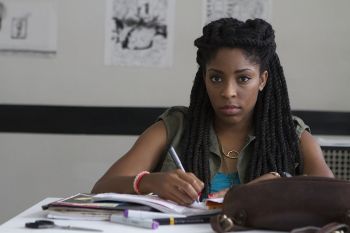By John Duncan Talbird.
New Zealand has given the world actors Sam Neil and Russell Crowe and directors Jane Campion and Peter Jackson. But above all others, I would have to express a soft spot for New Zealander Jemaine Clement, one half of the folk pop comedy duo, Flight of the Conchords, which had its own HBO series from 2007-2009. With his deadpan delivery, dramatic eyebrows, and nerd’s glasses, Clement masterfully plays the blowhard buffoon, a guy who thinks he’s much better with the ladies than he really is. From the revenge-obsessed nunchucks-wielding Jarrod of Eagle vs. Shark (2007) to “Jemaine” in Conchords to the 862-year-old vampire Vladislav in the mockumentary What We Do in the Shadows (2014), he has proven himself adept at making himself comfortable in strange and hilarious worlds. He’s even ventured into the primary-colored and two-dimensional narratives of cartoons where he’s voiced a bird (Rio, 2011), a fart (Rick and Morty, 2015), and, in the upcoming Roald Dahl adaptation, The BFG (2016), an evil giant. So it’s refreshing to see him take a turn as an understated character, the lead role in the recent indie dramedy, People Places Things, written and directed by James C. Strouse.
 Clement plays Will Henry, graphic novelist and father of twins. On the morning of Will’s daughters’ birthday (adorably played by sisters Aundrea and Gia Gadsby) he discovers his wife (Stephanie Allynne) upstairs having sex with some pasty, overweight guy played by Michael Chernus (a regular on the Netflix series Orange Is the New Black). This leads to the inevitable breakup and the rest of the film is about Will figuring out how to get over his heartbreak. What keeps the movie from being completely meager and indistinguishable from any other Getting Over the Breakup movie is Will’s day job as an adjunct professor of comic book art at Manhattan’s School of Visual Arts (SVA), specifically his relationship with his student Kat (played with charming naturalism by The Daily Show’s Jessica Williams). Feeling sorry for Will, Kat impulsively sets him up on a date with her single mother Diane (Regina Hall). Diane is also a professor of Early American Literature at Columbia who doesn’t take comics seriously as an art form. (Apparently, in this reality postmodernism has never happened to upset rigid dichotomies of high and low art; and I suppose Art Spiegelman — who teaches at SVA in real life — hasn’t won the Pulitzer prize in this reality, either). So, of course, they don’t get along at first, but ultimately we’re not surprised when they find themselves in bed (or, in this case, on the floor of her office at school).
Clement plays Will Henry, graphic novelist and father of twins. On the morning of Will’s daughters’ birthday (adorably played by sisters Aundrea and Gia Gadsby) he discovers his wife (Stephanie Allynne) upstairs having sex with some pasty, overweight guy played by Michael Chernus (a regular on the Netflix series Orange Is the New Black). This leads to the inevitable breakup and the rest of the film is about Will figuring out how to get over his heartbreak. What keeps the movie from being completely meager and indistinguishable from any other Getting Over the Breakup movie is Will’s day job as an adjunct professor of comic book art at Manhattan’s School of Visual Arts (SVA), specifically his relationship with his student Kat (played with charming naturalism by The Daily Show’s Jessica Williams). Feeling sorry for Will, Kat impulsively sets him up on a date with her single mother Diane (Regina Hall). Diane is also a professor of Early American Literature at Columbia who doesn’t take comics seriously as an art form. (Apparently, in this reality postmodernism has never happened to upset rigid dichotomies of high and low art; and I suppose Art Spiegelman — who teaches at SVA in real life — hasn’t won the Pulitzer prize in this reality, either). So, of course, they don’t get along at first, but ultimately we’re not surprised when they find themselves in bed (or, in this case, on the floor of her office at school).
 What shines amidst all the tired plot developments is Will’s relationship with his two daughters and his evolving friendship with Kat. Clement has a seemingly effortless rapport with these two six-year-olds so that at some point, you forget that they’re actors who probably don’t know each other that well. And the most complex and engaging aspect of the film is the way that we see Will’s relationship with Kat evolve over the course of the narrative, as he moves from being a depressed and mopey teacher to a colleague that she can trade creative work with and speak to as an equal. The only weak and unconvincing character is the ex-wife, Charlie. Despite Allynee’s quirky, humorous performance, the character is baffling and a bit of a straw man. She’s an awful person, self-absorbed and a dingbat. She asserts that she’s a caring mother who has filled her children’s schedules with edifying and enriching activities, makes sure they eat well and yet drops them on her ex’s stoop at night without notice so that she can go to an improv class that she doesn’t really care about. She blames Will for the end of their marriage even though she’s the one who’s been cheating. For god’s sake, she’s sleeping with some guy in the same house where her daughters’ birthday party is going on. Despite all this, we’re expected to think that Will holds her no ill-will, only her lover, which cheaply elevates Will in the audience’s eyes at the expense of flattening Charlie into one part villain, one part space cadet.
What shines amidst all the tired plot developments is Will’s relationship with his two daughters and his evolving friendship with Kat. Clement has a seemingly effortless rapport with these two six-year-olds so that at some point, you forget that they’re actors who probably don’t know each other that well. And the most complex and engaging aspect of the film is the way that we see Will’s relationship with Kat evolve over the course of the narrative, as he moves from being a depressed and mopey teacher to a colleague that she can trade creative work with and speak to as an equal. The only weak and unconvincing character is the ex-wife, Charlie. Despite Allynee’s quirky, humorous performance, the character is baffling and a bit of a straw man. She’s an awful person, self-absorbed and a dingbat. She asserts that she’s a caring mother who has filled her children’s schedules with edifying and enriching activities, makes sure they eat well and yet drops them on her ex’s stoop at night without notice so that she can go to an improv class that she doesn’t really care about. She blames Will for the end of their marriage even though she’s the one who’s been cheating. For god’s sake, she’s sleeping with some guy in the same house where her daughters’ birthday party is going on. Despite all this, we’re expected to think that Will holds her no ill-will, only her lover, which cheaply elevates Will in the audience’s eyes at the expense of flattening Charlie into one part villain, one part space cadet.
 This kind of uneven plot is not new with Strouse, and I’m thinking he might benefit from a cowriter or perhaps simply a screenwriter. Strouse’s previous film, The Winning Season (2009), was also flawed and sometimes baffling despite a strong performance from Sam Rockwell, lurching from depressing to sentimental without much sense. In that movie, Rockwell plays an alcoholic who for some reason is given a job as a high school girls’ basketball coach and then is fired, but still manages to change those girls’ lives so that Nothing Will Ever Be the Same Again, etcetera. It seems that Strouse is interested in the mentor-student relationship and is avoiding the pitfalls of similar types of stories. Namely, these mentors, despite their flaws, aren’t creeps (i.e., they don’t want to sleep with their students). I’d like to see Strouse tackle this subject straight on without all the clichéd accouterments, the tired romances, the sentimental endings, the infidelities and the alcoholics with hearts of gold. It seems he’s moving in the right direction. People Places Things is a familiar story like The Winning Season, but it still manages — working within the constraints of the indie slacker genre — to be affecting and diverting and only partly annoying.
This kind of uneven plot is not new with Strouse, and I’m thinking he might benefit from a cowriter or perhaps simply a screenwriter. Strouse’s previous film, The Winning Season (2009), was also flawed and sometimes baffling despite a strong performance from Sam Rockwell, lurching from depressing to sentimental without much sense. In that movie, Rockwell plays an alcoholic who for some reason is given a job as a high school girls’ basketball coach and then is fired, but still manages to change those girls’ lives so that Nothing Will Ever Be the Same Again, etcetera. It seems that Strouse is interested in the mentor-student relationship and is avoiding the pitfalls of similar types of stories. Namely, these mentors, despite their flaws, aren’t creeps (i.e., they don’t want to sleep with their students). I’d like to see Strouse tackle this subject straight on without all the clichéd accouterments, the tired romances, the sentimental endings, the infidelities and the alcoholics with hearts of gold. It seems he’s moving in the right direction. People Places Things is a familiar story like The Winning Season, but it still manages — working within the constraints of the indie slacker genre — to be affecting and diverting and only partly annoying.
It also gives a fresh platform for Clement to work in. Other comedians have shown that they can make the transition from comedy to drama nicely, like Robin Williams (Good Will Hunting, 1998), Jim Carey (Man on the Moon, 1999), or Bill Murray (Lost in Translation, 2004). Comedians who perform in front of live audiences are probably more aware of audience expectations than most actors — they immediately know if they’re reaching their audiences based on the laughter they hear (or not). Also, they’ve made careers out of performing some version of “themselves” which seems to make them less likely to engage in method acting or any other type of over-the-top claptrap and often their performances are subtle and realistic and very often affecting. (Who would have thought that Andrew Dice Clay could act a lick, but check him out in Woody Allen’s Blue Jasmine [2013] to see what he’s capable of.) Clement shines in the imperfect People Places Things, and I hope that he has more and better opportunities that allow him to explore his range.
John Duncan Talbird is the author of the just-released, limited edition book of stories, A Modicum of Mankind (Norte Maar) with images by artist Leslie Kerby. His fiction and essays have recently appeared or are forthcoming in Ploughshares, Juked, The Literary Review, Amoskeag, REAL and elsewhere. An English professor at Queensborough Community College, he lives with his wife in Brooklyn.

